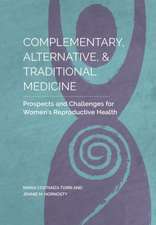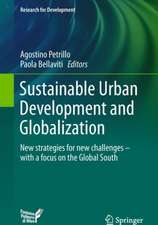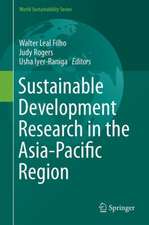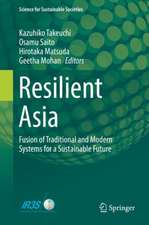Bridges Between Tradition and Innovation in Ethnomedicine: Fostering Local Development Through Community-Based Enterprises in India
Autor Maria Costanza Torri, Thora Martina Herrmannen Limba Engleză Paperback – 16 oct 2014
| Toate formatele și edițiile | Preț | Express |
|---|---|---|
| Paperback (1) | 637.59 lei 6-8 săpt. | |
| SPRINGER NETHERLANDS – 16 oct 2014 | 637.59 lei 6-8 săpt. | |
| Hardback (1) | 643.84 lei 6-8 săpt. | |
| SPRINGER NETHERLANDS – 3 aug 2011 | 643.84 lei 6-8 săpt. |
Preț: 637.59 lei
Preț vechi: 750.11 lei
-15% Nou
Puncte Express: 956
Preț estimativ în valută:
122.02€ • 132.49$ • 102.49£
122.02€ • 132.49$ • 102.49£
Carte tipărită la comandă
Livrare economică 22 aprilie-06 mai
Preluare comenzi: 021 569.72.76
Specificații
ISBN-13: 9789400795105
ISBN-10: 9400795106
Pagini: 240
Ilustrații: XIII, 222 p.
Dimensiuni: 155 x 235 x 13 mm
Greutate: 0.34 kg
Ediția:2011
Editura: SPRINGER NETHERLANDS
Colecția Springer
Locul publicării:Dordrecht, Netherlands
ISBN-10: 9400795106
Pagini: 240
Ilustrații: XIII, 222 p.
Dimensiuni: 155 x 235 x 13 mm
Greutate: 0.34 kg
Ediția:2011
Editura: SPRINGER NETHERLANDS
Colecția Springer
Locul publicării:Dordrecht, Netherlands
Public țintă
ResearchCuprins
Introduction.- 1. The Entrepreneurship and the Role of Local Communities.- 2. Traditional Ethnobiological Knowledge and Bioprospecting.- 3. The Gram Mooligai Limited Company (GMCL) – An Alternative Bioprospecting and Development Model: Constitution, Structure and Its Functioning.- 4. Ethnomedicine, Capacity Development and Innovation System Through GMCL.- 5. GMCL, The Supply Chain and The Final Market.- The Impact of GMCL On Indigenous Communities.- The Impact of GMCL On Indigenous Communities.- Conclusion.- Index.
Textul de pe ultima copertă
Community-based enterprises are the result of a process in which the community acts entrepreneurially to create and operate a new enterprise embedded in its existing social structure and network. This book argues that community-based enterprise could represent a strategy for fostering sustainable local development while at the same time maintaining traditional knowledge in ethnomedicine and conserving the local ecosystems.
The overall purpose of this monographic study is to investigate a new entrepreneurial approach which offers an alternative to the mainstream one and to analyze its possible contribution at the grassroots level in the herbal sector, a domain where local communities still play to a large extent a marginalised role. This innovative approach is represented by community-based enterprises (CBEs) active in India.
The study of indigenous populations and their different forms of entrepreneurships is not simply an exercise in analysing outliers in the global world-system. Rather, it provides a source for the theoretical and empirical analysis of entrepreneurship relevant to the development of generalisable theory applicable in many environments including, but by no means exclusive to, indigenous communities.
This volume analyses the very first community-based enterprise active in the herbal sector in India, the GMCL (Gram Mooligai Company Limited). It demonstrates that the GMCL example provides a unique model of how a community-based enterprise could represent an alternative and promising model for development of local communities. It is an unconventional form of entrepreneurship, in that it is based on regarding collective and individual interests as fundamentally complementary, and views communal values and the notion of the common good as essential elements in venture creation.
The overall purpose of this monographic study is to investigate a new entrepreneurial approach which offers an alternative to the mainstream one and to analyze its possible contribution at the grassroots level in the herbal sector, a domain where local communities still play to a large extent a marginalised role. This innovative approach is represented by community-based enterprises (CBEs) active in India.
The study of indigenous populations and their different forms of entrepreneurships is not simply an exercise in analysing outliers in the global world-system. Rather, it provides a source for the theoretical and empirical analysis of entrepreneurship relevant to the development of generalisable theory applicable in many environments including, but by no means exclusive to, indigenous communities.
This volume analyses the very first community-based enterprise active in the herbal sector in India, the GMCL (Gram Mooligai Company Limited). It demonstrates that the GMCL example provides a unique model of how a community-based enterprise could represent an alternative and promising model for development of local communities. It is an unconventional form of entrepreneurship, in that it is based on regarding collective and individual interests as fundamentally complementary, and views communal values and the notion of the common good as essential elements in venture creation.
Caracteristici
Provides insights into innovative indigenous enterprises active in bioprospecting scenarios Offers theoretical and empirical analysis of entrepreneurships of indigenous populations Develops public awareness of more equitable and participative approaches to communities’ use of traditional knowledge and new forms of partnerships between the different stakeholders


























